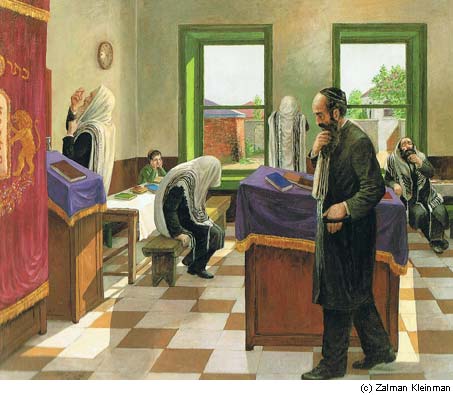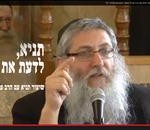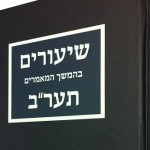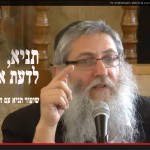Rabbi Shneur Zalman of Liadi The Alter Rebbe Parshat Ki-Teze 5565-1805 (1) first version
Indented text by the translator
Soul Time
A person’s soul illustrates this concept. It is constantly in motion; every moment the soul dashes above, only to return below. An interval separates these two states. For the soul’s forward-reverse movement is divided into two stages: it first flees above, and afterwards shines below.
A heart beats in couplets. The soul’s life-energy returns to its spiritual source above upon the initial pulse. It returns to the body as the heart pounds the second beat.
Regarding Emanation’s source, this dual motion is termed “coming and not coming.” Hence, within God—the m’atzil Himself—exists an oscillation which serves as the ultimate cause for the order of time. That’s what enables the earlier emanation of Wisdom to be followed by Understanding. Obviously, time hasn’t been created as an actual entity. Rather, God’s coming and not coming acts as the origin of Emanation’s order of time.
No Time
Those familiar with the teachings of Kabbalah understand that prior to Emanation, time didn’t exist in any form. God’s ineffable name— y-hvh—is constructed from the Hebrew root of the word “to be.” His Name, then, connotes the simultaneous manifestation of past, present, and future. This Name is revealed in the world of Emanation, where past, present, and future are united. Yet the Essence of God’s Infinite Light is beyond even this quality. It is Absolute Infinity; elevated above any definition of time.
The Talmud rhetorically asks, “And does God age?” And the prophet Malachi writes, “Since I am God, I do not change.”
A question, though, arises. How could an intermediary emerge that links the Essence of the Infinite Light—abstracted beyond time—with emanations, which possess the order of time? And from where did this intermediary acquire the quality of coming and not coming which enables it to serve as the source for Emanation’s order of time? Isn’t there an unbridgeable gap separating the Infinite Light from Emanation?
In-between Time
A unique type of intermediary provides the solution to this dilemma. Termed Primordial Man by Kabbalah, this go-between connects the Infinite Light with the world of Emanation. “It precedes all the antecedents,” says the Zohar. Primordial Man is also called the antecedent thought. “It observes and sees in a single glance all of creation ‘till the end of time,” says the Talmud. It is referred to as “a solitary thought.”
References
Soul Time
every moment the soul dashes above, only to return below
Sefer Yetzirah, chapter 1, section 6;
The Book of Ezekiel, chapter 1, verse 14.
A heart beats in couplets.
Tikunei Zohar, chapter 69, page 108, side a;
Kehillat Ya’akov, section Dofkim, page 5, column b.
The soul’s life-energy returns to its spiritual source above upon the initial
Mishnat Hassidim, Tractate Gemilas Hassidim, chapter 1, section 3.
“coming and not coming”
The First Book of the Zohar, page 15, side b;
Eitz Chaim, portal 4, chapter 2.
No Time
y-hvh—is constructed from the Hebrew root of the word “to be”
Raya Mehemna, The Second Book of the Zohar, page 257, side b;
Shelah, Sefer Bereishis, parshat Bereishis, chapter Torah Ohr, paragraph 7.
His Name, then, connotes the simultaneous manifestation of past …
Raya Mehemna, The Second Book of the Zohar, page 257, side b;
Shulchan Aruch, Orech Chaim, chapter 5, paragraph 1;
Pardess Rimmonim, portal 1, chapter 9.
This name is revealed in the world of Emanation
Eitz Chaim, portal 3, chapter 1; ibid., portal 42, chapter 1.
“And does God age?”
The Babylonian Talmud, Tractate Yevomot, page 16, side b.
“Since I am God, I do not change.”
The Book of Malachi, chapter 3, verse 6.
In-between Time
this go-between connects the Infinite Light with the world of Emanation
Eitz Chaim, portal 42, chapter 1, section 2.
“It precedes all the antecedents”
Tikunei Zohar, chapter 19, page 42, side a;
Eitz Chaim, portal 1, section 2.
Primordial Man is also called the antecedent thought.
Tikunei Zohar, chapter 69, page 111, side a;
Pardess Rimmonim, portal 23, chapter 13;
Eitz Chaim, portal 10, chapter 2.
“It observes and sees in a single glance all of creation ‘till the end of time”
The Babylonian Talmud, Tractate Rosh Hashana, page 18, side a.
It is referred to as “a solitary thought.”
The Second Book of the Zohar, page 20, side a.







